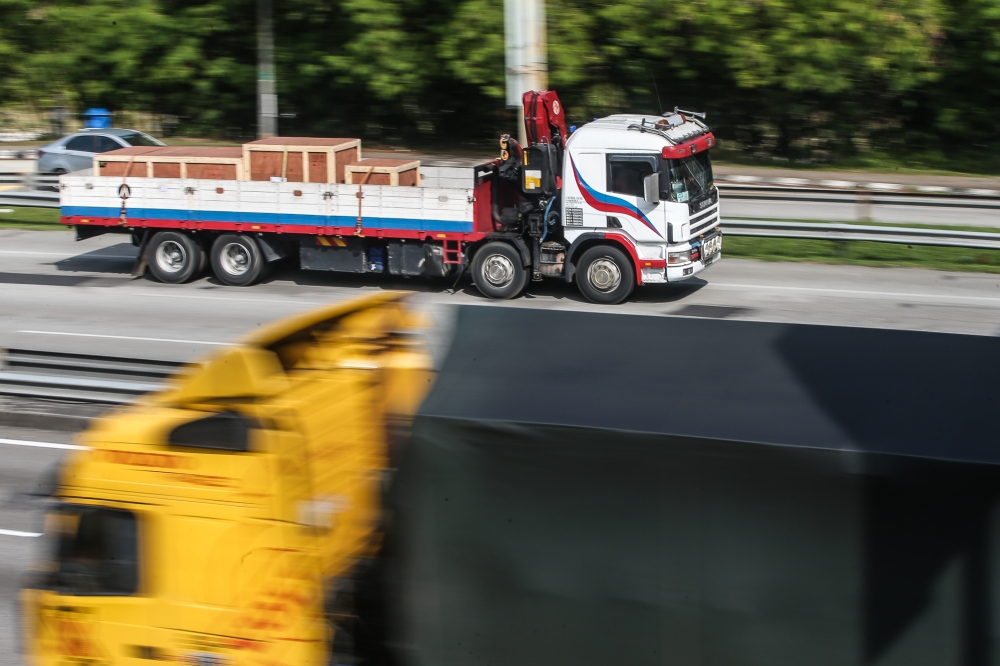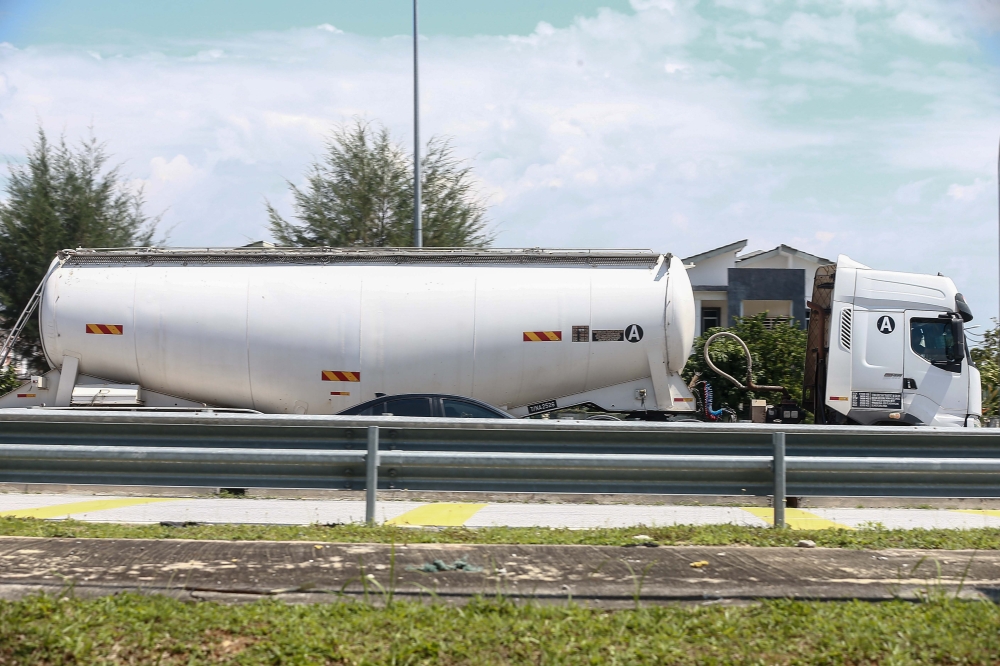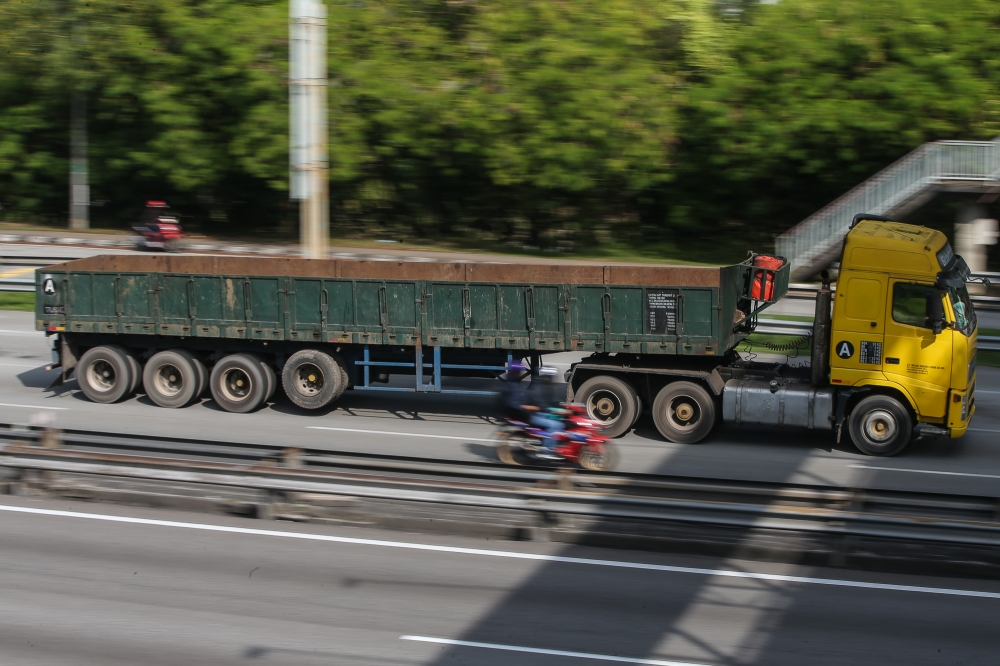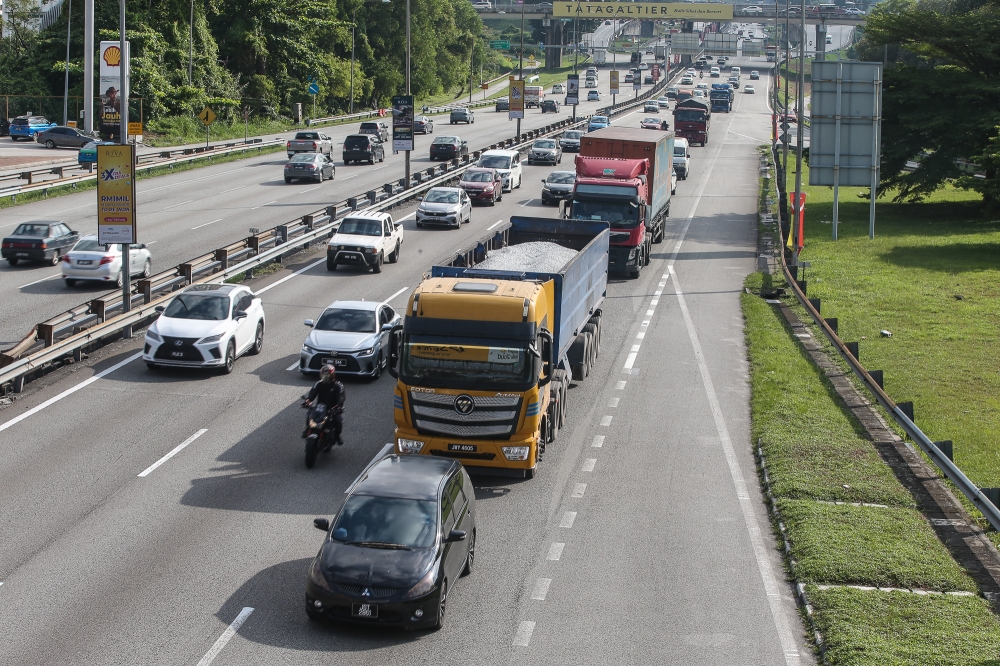KUALA LUMPUR, Jan 6 — Are road accidents involving lorries more likely to result in fatalities, and how do Malaysia’s laws penalise unsafe behaviours such as driving for extended periods or operating an overloaded lorry?
Here’s a quick summary of what you need to know:
1. Do you know how many fatalities in Malaysia were caused by road accidents involving lorries?
Last month, Bernama reported that Bukit Aman’s Traffic Investigation and Enforcement Department director CP Datuk Seri Mohd Yusri Hassan Basri said that 3,500 road accidents nationwide involving lorries from January 2019 to November 2024 had resulted in:
- 1,457 deaths
- 473 cases with severe injuries
- 1,076 cases with mild injuries
In the same period, 548 road accidents involving buses were recorded, resulting in:
- 153 deaths
- 120 cases of severe injuries
- 218 cases of mild injuries
Last month, Sinar Harian reported that Mohd Yusri stated that 17,905 vehicles were involved in fatal road accidents from January to October 2024, with:
- 5,364 deaths
- 825 lorries involved in these fatal cases
2. Yes, road accidents involving lorries are more likely to result in deaths
In a research paper published by the Malaysian Institute of Road Safety Research (Miros) in 2019, their analysis of police road accident data from 2011 to 2015 found that accidents involving heavy goods vehicles (lorries and trailers) resulted in more than 1,000 deaths each year, despite the relatively small number of lorries on the road.
The study also found that more than 80 per cent of these fatal accidents involving heavy goods vehicles resulted in fatalities for those in other vehicles.
In another research paper published in 2021, based on the Malaysian Highway Authority’s 2018 data of accidents on its highways, it was found that road accidents involving heavy vehicles were more likely to result in fatalities compared to those involving cars.
Out of the 27,476 accidents on Malaysian highways in 2018, 4,637 (17 per cent) involved heavy vehicles.
Of the 940 fatal accidents on highways that year, 245 (26 per cent) involved heavy vehicles.
Of these 245 accidents:
- 125 (51 per cent) involved lorries
- 79 (32.2 per cent) involved trailers
- 13 each (5.3 per cent) involved tank trucks and express buses
The remaining accidents involved low loaders, tour buses, cranes, shuttle buses, and school buses, each accounting for five or fewer cases

3. What were the most common traffic offences for lorry drivers this year?
Bernama also reported last month that Bukit Aman’s Mohd Yusri stated the police had issued 45,237 summonses during 235,616 inspections of commercial vehicles across 5,747 operations nationwide from January to November 2024.
The bulk of the summonses (28,298, or about 62 per cent) were issued to lorries, while 349 were for buses and 16,590 for multi-purpose vehicles.
The top traffic offences for commercial vehicles during those 11 months were:
- Operating without a valid Public Service Vehicle (PSV) licence (10,859 summonses)
- Using telecommunications devices while driving (9,254)
- Expired Motor Vehicle Licence or road tax (8,380)
- Disobeying red traffic lights (3,676)
- Expired driving licences (2,179)
The police launched investigations into 380 commercial vehicles for overloading and seized 154 lorries, while 45 commercial drivers were arrested, including 12 charged with drug offences.
Last November, Bernama also reported that Mohd Yusri as saying that 38,367 traffic summonses were issued from January to September 2024, with commercial vehicles contributing to 168 accidents (97 deaths, 32 serious injuries, and 39 mild injuries).
He stated that the main offences included:
- Vehicles carrying dangerous or unsecured loads
- Tyres without tread
- The absence of a safety triangle
- Non-functioning signal indicators
- Faulty brakes
Of the 95,298 summonses issued by the police in Malaysia from January to November 2024 for running red lights, about four per cent, or 3,937, were issued to lorry drivers.
In October 2022, Bernama reported Bukit Aman’s Traffic Investigation and Enforcement Department’s principal assistant director Supt Dr Bakri Zainal Abidin as saying that 80 per cent of road accidents involving heavy vehicles are caused by the “negligence of the drivers themselves”.
4. What about the Road Transport Department (JPJ) which also issues its own summonses?
On December 5, Deputy Transport Minister Datuk Hasbi Habibollah told Dewan Negara that between 2022 and 2024, the JPJ issued 1,512,916 summonses for offences committed by commercial goods vehicles under the Road Transport Act 1987.
The offence of overloading alone resulted in:
- 7,259 compounds issued under the Commercial Vehicles Licensing Board Act 1987
- 4,980 investigation papers under the Land Public Transport Act 2010
Hasbi said that the JPJ also conducted 5,559 safety audits on 3,088 companies for commercial vehicles from 2019 to October 2024.
In 2024 alone, the JPJ:
- Suspended 210 operators’ licences and 67 vehicle permits
- Revoked two operators’ licences and 32 vehicle permits
Last August, JPJ Director-General Aedy Fadly Ramli said the JPJ issued 856,873 summonses for commercial vehicles from January 2023 to July 2024, including for the following offences:
- Lack of driving licences or CDL (81,263)
- Expired driving licences (5,077)
- Overloading (63,686)
- Lack of motor vehicle licences (396)
- Expired motor vehicle licences (96,215)
- No insurance (36,709)
- Tyre issues (29,060)

5. Now why does this matter?
Malaysia already has sufficiently strict regulations to ensure that lorry drivers are fit and qualified to drive, and that their lorries are roadworthy.
Lorry drivers must hold a valid driving licence and undergo an annual medical examination to renew their vocational licence (an additional Goods Driving Licence).
The lorries are required to undergo vehicle inspections every six months, with their motor vehicle licences renewed either every six months or annually, depending on the vehicle.
However, according to the JPJ summonses issued, many lorry drivers and companies still fail to renew their licences, which likely means they are also bypassing the required health and vehicle checks.
6. So, what kind of legal measures are available?
Lorry drivers are subject to the same traffic laws as other motorists in Malaysia, including penalties for speeding, reckless driving, and causing death or injury while under the influence of alcohol or drugs.
However, there are also specific traffic offences that apply to lorry drivers, such as regulations aimed at preventing fatigued or drowsy drivers from continuing to operate a lorry or bus.
Under Rule 10B of the Road Traffic Rules 1959, you will break the law as a lorry driver or bus driver if you:
- drive for more than four consecutive hours or more than 300 km;
- drive for more than four consecutive hours or more than 300km without having a second driver to replace you. The first driver must be replaced once he hits the time or distance limit;
- drive more than a total of eight hours within a 24-hour period;
- do not record in a logbook the vehicle’s movement and the replacement of the driver; or
- if you fail to bring along the logbook in the lorry or bus.
The time limit of a maximum four straight hours includes any breaks taken by lorry drivers or bus drivers during the trip.
Breaking Rule 10B will result in summonses, with the fine between RM150 to RM300, depending on how soon you pay the summonses.
Separately, when lorries are overloaded, this could result in fines or even jail time, depending on how serious it is.
Depending on the type of vehicle and its load weight limit, lorry drivers could be punished with a RM300 fine under the Road Transport Act 1987 (such as when the truck is overloaded less than 35 per cent beyond its limit).
Drivers of lorries overloaded by more than 35 per cent face a fine of between RM1,000 and RM500,000, or a maximum jail term of two years, or both when convicted for the overloading offence under Section 57(1)(b)(vi) of the Land Public Transport Act 2010.
Under Section 80 of the Land Public Transport Act, lorries suspected of committing the overloading offence under Section 57 can be seized by the police, JPJ, or the Land Public Transport Agency (APAD). The court can also order the forfeiture or release of such vehicles.
In cases of severe overloading (e.g., more than 70 per cent of the allowed load limit) and repeated offences, lorries may also be seized.
The full list of over 800 traffic offences that road users in Malaysia may face can be found here on JPJ's website.

7. Did you know that lorries are banned or restricted from roads during festive seasons?
During festive seasons, such as just before and after Hari Raya Aidilfitri and Chinese New Year, the government typically issues and gazettes bans on lorries or limits the hours they can be on the road to reduce traffic jams and the risk of road accidents.
For example, last year, during the pre- and post-hometown rush days, certain heavy vehicles were prohibited from being on the road from midnight to 8am (e.g., container lorries transporting goods, cargo lorries without load) or were not allowed on the road at all on those days (e.g., lorries with a laden weight exceeding 7,500kg and transporting construction materials).
8. Could this be a money problem? Or are there other factors at play?
In January last year, the logistics industry was reported to be facing a shortage of lorry drivers, with many drivers receiving commission-based pay depending on the weight of goods carried.
Lorry drivers have also reportedly faced the issue of having to pay fines for traffic offences, even when these were caused by their employers' negligence.
There have also been reports of lorry drivers admitting to using drugs for an energy boost to endure long road journeys.

9. Can we do better?
On December 5, Deputy Transport Minister Datuk Hasbi Habibollah told the Dewan Negara that the overloading offence is one of the causes of brake system failure, particularly due to overheating when going downhill.
To ensure commercial vehicles comply with weight limits, Hasbi said a new system called the High-Speed Weigh-in-Motion System (HSWIM) would be introduced, capable of weighing vehicles moving at speeds of up to 120 kilometres per hour.
Hasbi added that this new system would enable real-time monitoring of heavy vehicles, with summonses issued immediately, similar to the Automatic Awareness Safety System (AWAS) speed camera system.
On January 2, 2025, Transport Minister Anthony Loke said his ministry will work to close a loophole, where some commercial vehicle owners temporarily change out worn tyres in order to pass the mandatory vehicle inspections.
On August 6, 2024, Loke raised the idea of potentially amending Section 45A of the Road Transport Act 1987 to introduce the offence of driving under the influence of drugs, even if no accidents occur.
He explained that drivers who take drugs can only be charged in court if they cause road accidents, while those who take drugs but do not cause accidents cannot be charged and may only have their licences suspended.



















